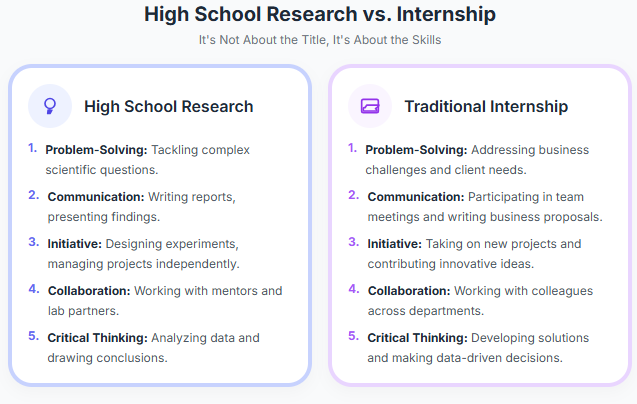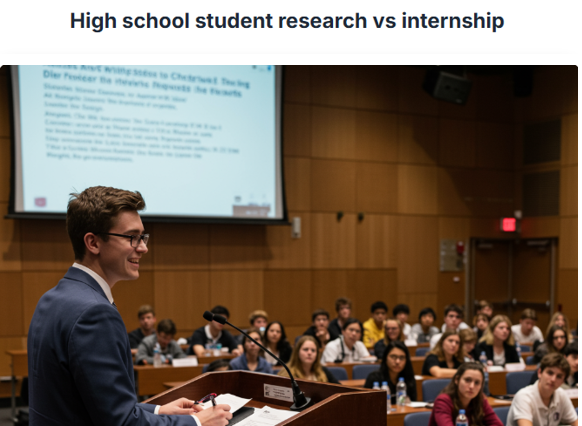Table of Contents
ToggleDon’t let the pressure to get a formal internship sideline your incredible academic work. In this resource, we’ll move past the classic debate of a high school student research versus internship to give you expert tips on how to frame your high school research position as a professional internship on college applications and resumes, unlocking the full potential of your experience.
The High School Hustle: Internships and the College Race
The Internship Itch: The High School Student Research vs. Internship Debate
- For many high school students, the pursuit of a prestigious internship has become a top priority in college admissions, signifying ambition and professional readiness. This focus on traditional corporate, medical, or legal internships can lead to a pervasive sense that other valuable experiences, like a student research position, are somehow less valuable.
- The intense pressure to secure a formal internship often makes students feel that an intellectually demanding research project won’t measure up. This blog post, however, aims to challenge that perception, directly addressing the core debate of high school student research versus internship.
- Ultimately, this resource will show readers that their academic pursuits are not only valid but can be framed to stand out, giving them a distinct advantage in the competitive college admissions process.

The Research Reality: Beyond the Student Research vs. Internship Myth
- Stepping away from the traditional corporate ladder, a high school student research position in a lab or university setting offers a unique, hands-on experience rooted in intellectual curiosity. While some students are chasing formal internships, others are immersed in investigative work, tackling complex problems with academic rigor. The day-to-day reality often involves designing experiments, analyzing vast datasets, and collaborating with professors and graduate students.
- This intensive experience, however, is often undervalued by students themselves in the face of the widely accepted student research vs. internship narrative. They question whether the skills learned from a failed experiment or a deep dive into historical archives can compete with the seemingly more professional environment of a marketing or engineering firm. The perception is that internships build “real-world” skills, while research is purely academic.
- What many fail to realize is that the independence and initiative required for this kind of work are precisely the qualities top universities seek. This position is a proving ground for intellectual vitality, demonstrating a passion for learning beyond the classroom. The dilemma of student research vs. internship is a false one; both offer a path to showcasing valuable skills. This post aims to showcase how the perception of research as purely academic is far from the truth, proving its exceptional value.
Struggling with academic writing? studentresearch.com provides expert assistance 24/7! We help with all subjects and guarantee top grades, so you can focus on what matters.
The Core Argument: Why Student Research vs. Internship Is a False Dilemma
- Stepping away from the traditional corporate ladder, a student research vs. internship position in a lab or university setting offers a unique, hands-on experience rooted in intellectual curiosity. While some students are chasing formal internships, others are immersed in investigative work, tackling complex problems with academic rigor. The day-to-day reality often involves designing experiments, analyzing vast datasets, and collaborating with professors and graduate students.
- This intensive experience, however, is often undervalued by students themselves in the face of the widely accepted student research vs. internship narrative. They question whether the skills learned from a failed experiment or a deep dive into historical archives can compete with the seemingly more professional environment of a marketing or engineering firm. The perception is that internships build “real-world” skills, while research is purely academic.
- What many fail to realize is that the independence and initiative required for this kind of work are precisely the qualities top universities seek. This position is a proving ground for intellectual vitality, demonstrating a passion for learning beyond the classroom. The dilemma of student research vs. internship is a false one; both offer a path to showcasing valuable skills. This post aims to showcase how the perception of research as purely academic is far from the truth, proving its exceptional value. This is the ultimate answer to the student research vs. internship question.

The Hidden Value of the Lab Coat: Unpacking Your Research Experience
You’ve seen the myth, but now it’s time to uncover the truth: a skilled high school student can absolutely frame their research in a way that makes colleges and future employers view it as a powerful professional internship.
You may see your research as purely academic. The reality is that your lab work developed powerful, quantifiable skills. This reframing is key.
· Think beyond lab notes and into problem-solving. Every unexpected result was an opportunity. You tackled open-ended questions. Your work mirrors a professional’s. They solve business problems.
· Communication is another key skill. Writing lab reports is like writing business proposals. Presenting findings at a symposium mirrors presenting to a team. This proves your professional communication skills.
· Your project also required significant collaboration. You worked closely with a mentor. You communicated with lab partners. This teamwork is critical for any career. You showed you can contribute to a team.
· A research position also demands self-discipline. You owned a long-term project. You had to manage your own time. These are the building blocks of professional success.
· Ultimately, the debate of high school student research vs. internship is a false one. Both experiences build a similar skill set. The skills are directly transferable to any field.
· Don’t just list what you did. Translate your actions into marketable skills. Show employers what you can do. This mindset gives you a competitive edge. Here is a valuable resource on how to build your resume.
· To learn more about how to develop your communication skills, consider exploring this guide on effective public speaking.
To truly understand this crossover, let’s break down the key similarities between a high school research position and a traditional internship in a simple comparison table..
The Art of the Frame: Crafting Your Application Story
Now that you understand how to reframe your lab work and leverage your mentor’s support, you’re ready to learn how to showcase these powerful skills. It’s at this crucial point that your skillfully reframed high school student research work can indeed be considered a professional internship on your applications.
- The skills you gained are just the beginning. Now you must craft a compelling narrative. This is where you move beyond a simple list. You must turn your experience into a powerful story. A story shows colleges who you are. This is how you win the student research vs. internship debate.
- The common debate of student research vs. internship misses this point. Your research project gives you a unique story to tell. An internship may be about doing a job. Your research was about solving a puzzle. This gives you a richer narrative.
- Think about a moment of failure. Perhaps an experiment did not work. How did you troubleshoot? What did you learn? This shows resilience and grit. Those qualities are highly valued by colleges. They are far more important than a perfect result. In the context of student research vs. internship, this narrative is incredibly powerful.
- Consider a moment of discovery. Did you find a pattern in your data? How did that make you feel? That emotional connection to your work is powerful. It demonstrates true intellectual curiosity. This separates your story from others. This is a crucial element in the student research vs. internship argument.
- Your narrative should focus on your personal growth. You are not just a lab assistant. You are a problem-solver and a critical thinker. This approach helps you win the student research vs. internship debate. Your story proves your value.
- In the grand scheme of student research vs. internship, a story based on your personal journey is your greatest asset. It shows your motivation. It reveals your passion. This is what colleges want to see. This is the true meaning of student research vs. internship success.
- This narrative can be the backbone of your essays. It can make your personal statement unforgettable. Ultimately, your research is a story of your potential. A story of a student research vs. internship victory.
The Mentorship Advantage
- A unique benefit of your research is the powerful recommendation you can secure. Your research mentor is more than just a supervisor. They are an expert in their field. They have a front-row seat to your work. They can speak to your dedication. The value here surpasses the student research vs. internship dilemma.
- A mentor sees your intellectual curiosity in action. They observe your problem-solving abilities. This deep insight is invaluable. It goes far beyond a typical internship evaluation. This is another key factor in the student research vs. internship comparison.
- An internship supervisor might evaluate your work ethic. A research mentor can comment on your potential. They can discuss your passion for learning. Admissions officers find this kind of insight very compelling. This difference between student research vs. internship is significant.
- This relationship gives you a distinct advantage. Your recommender can detail your independent work. They can explain how you handled setbacks. They can provide specific, powerful examples. This is the kind of letter that makes a significant impact on college applications, and is often the winning factor in the student research vs. internship contest.
- A letter from a well-respected professor or researcher carries immense weight. To ensure you make the most of this opportunity, here is a guide on how to ask for a letter of recommendation. This is a great way to put the student research vs. internship debate behind you.
- This deep testimonial provides credibility to your application. It proves you’re ready for college-level academics. Learn more about what makes a recommendation letter stand out by reading this article on crafting a powerful recommendation. The student research vs. internship conversation is over with a strong recommendation.

The Takeaway: It’s All About Your Story and the Student Research vs. Internship Answer
As you’ve seen, the true value of your experience isn’t in the title. It’s in the skills you gained and the story you can tell. Your research position is not just a line on a resume; it’s a powerful narrative about your intellectual curiosity and professional growth. This resource has shared the 5 winning secrets to help you end the student research vs. internship debate for good.
- As you’ve seen, the true value of your experience isn’t in the title. It’s in the skills you gained and the story you can tell. Your research position is not just a line on a resume; it’s a powerful narrative about your intellectual curiosity and professional growth. This resource has shared the 5 winning secrets to help you end the student research vs. internship debate for good.
- Secret 1: Understand the Skill Crossover. You’ve learned to reframe common research activities as professional, quantifiable skills. This is the foundation of your powerful new narrative. It’s the first step to winning the student research vs. internship battle.
- Secret 2: Find Your Personal Narrative. You’ve discovered how to turn your challenges and breakthroughs into a compelling story that shows your resilience and passion for a subject. This is what truly separates your experience in the student research vs. internship debate.
- Secret 3: Leverage the Mentorship Advantage. You know the value of a powerful recommendation from a respected academic and how to secure it. This is your ace in the hole for the student research vs. internship dilemma.
- Secret 4: Master the Activity List Blueprint. You’ve learned how to use strong action verbs and quantify your accomplishments to make your entry stand out. This is a critical skill in the student research vs. internship showdown.
- Secret 5: Revolutionize Your Resume. You now know how to build a professional resume that highlights your research experience as a powerful, professional asset. This final secret gives you complete control over the student research vs. internship conversation.
- Your hard work in the lab has prepared you for this moment. Use these secrets to your advantage. It’s time to discover how to frame your high school research as a professional internship on your resume and show colleges exactly what you can do. The student research vs. internship debate is now officially over for you.
Tired of late nights? studentresearch.com offers an affordable, high-quality academic service for all assignments. Improve your grades and your GPA with us.